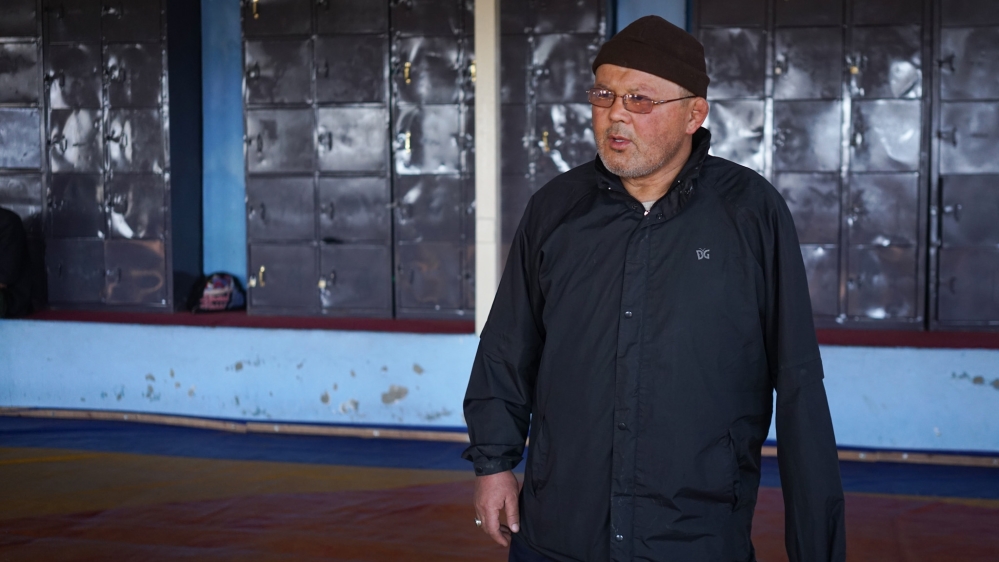Afghanistan’s persecuted Hazaras have little hope in peace talks
Kabul, Afghanistan – On September 5 last year, a Wednesday, coach Ghulam Abbas, 58, heard gunfire at the Maiwand Wrestling club in Dash-e-Barchi, a neighbourhood in Kabul’s west home to a sizeable Hazara community.
A guard yelled “suicide attacker!” and Abbas ran towards the emergency exit door, slamming it shut behind him.
But the attacker’s foot was trapped in the door.
A few seconds later, Abbas was on the ground, crying out in pain. He lost consciousness.
The suicide bomber had detonated his explosives.
Abbas lost his left arm. A second car bomb exploded a few minutes later just outside the club.
In total, at least 20 people were killed and 70 wounded in the assault claimed by the Islamic State of Iraq and the Levant (ISIL or ISIS) group.
 |
| Coach Ghulam Abbas lost his arm when a suicide bomber attacked the wrestling gym [Sorin Furcoi/Al Jazeera] |
Abbas describes it as an attack on the ethnic Hazara minority – a group accounting for up to 15 percent of Afghanistan’s estimated 30 million population – most of whom are Shia Muslims.
A month earlier, in August, a suicide bomber at an education centre in Kabul killed dozens of students.
The Hazara have long suffered oppression and persecution in Afghanistan. They are now often targeted by groups swearing allegiance to ISIL. In the 1990s, thousands were killed by al-Qaeda and Taliban fighters.
The Taliban declared them as “non-Muslims“ during their rule from 1996 to 2001.
“The government also does not do anything to protect us,” Abbas said.
As peace talks gather pace following a series of high-level meetings between US special envoy Zalmay Khalilzad and Taliban representatives over the past three months in Doha, Qatar, Hazaras are doubtful that the negotiations will stop the bloodshed.
“The peace deal relies on the withdrawal of US troops from Afghanistan and that is just one part of the conflict in the country,” said Abdullah, a Hazara taxi driver in his fifties who sustained minor injuries in the wrestling club attack.
His 16-year-old son Aliyar received 13 stitches on his right leg after he was injured in the same attack. Both of them used to train at the club.
 |
| The gym was rebuilt after coming under attack last September [Sorin Furcoi/Al Jazeera] |
Despite a sense of insecurity among Hazaras, Abdullah is hopeful after reading news of Afghan opposition leaders attending a meeting with the Taliban in Moscow.
Earlier this month, Afghanistan’s high-profile regional and ethnic leaders, including Mohammad Mohaqiq, a Hazara political figure, held a meeting with Taliban delegates in the Russian capital.
Afghan President Ashraf Ghani dismissed the Moscow talks, saying the Afghan opposition leaders participating had no negotiating authority.
Ghani has also been excluded from Doha talks but said Khalilzad, the US envoy, has kept him informed of progress.
“Everyone in this country is tired of war, we’ve seen many people die,” said Abdullah, the taxi driver. “We are now hungry for peace and prosperity.”
 |
| At least 20 people were killed in the attack on the gym, which many believed was a targeted assault against the Hazara minority [Sorin Furcoi/Al Jazeera] |
The wrestling club reopened in November; the main hall that was covered in blood and bodies was once again filled with young Afghans training.
Coach Abbas, who has taught students for almost 30 years, has also returned to the club.
“We still get warnings telling us to shut the club or risk being attacked again,” Abbas told Al Jazeera.
“These people don’t want to see progress and development in our community. But we continue to resist, returning to this club to coach again is a form of resistance.
“Even if I lose both my arms and legs, I will coach through my words.”




